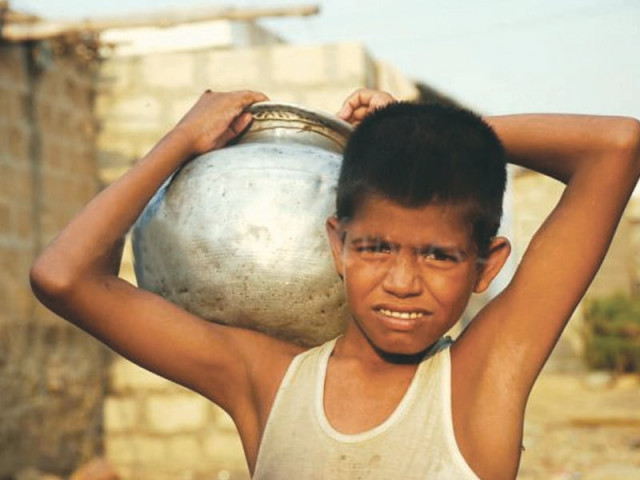Water Woes - Part VI: As Karachi expands, water shortfall and leaks grow
KWSB officials busy misappropriating funds, management authority fails to tackle sewage water problem.

Water Woes - Part VI: As Karachi expands, water shortfall and leaks grow
The city of Karachi is bursting at the seams but despite its growing population, now of approximately 18 million, the water supply has stayed the same in 20 years.
A feasibility report finalised in 2007 indicated that 1,200 cusecs cubic feet per second (cusecs) of 645 million gallons a day needs to be eventually added to the supply to satisfy the demand of the metropolis.
The bad news was that the Indus River System Authority (Irsa) had refused to increase the supply. The good news was that the provincial government had decided to fill the gap from the province’s quota.
The city’s existing water supply stands at 650 million gallons per day creating a shortfall of around 200 million gallons, while another 50 million gallons is lost because of the water-stealing mafia, vaporisation and leaks, Karachi Water and Sewerage Board (KWSB) Managing Director Misbahuddin Farid told The Express Tribune.
The answer to this problem is the K-IV water project, which is planned out and waiting for approval, he said.
“K-IV would fulfill the city’s drinking water needs for the next 50 years,” said the MD. “The estimated cost of the project in 2007 was Rs35 billion. The PC-I cost will keep increasing with time, but once the project is started, 600 million gallons of water per day would be added to the existing capacity in eight phases.”
The provincial assembly has constituted a committee to ensure that the project materialises and recommendations have also been submitted to President Asif Ali Zardari who is expected to give his approval soon, Farid said. According to a study by the Japan International Cooperation Agency (Jica), supply from River Indus is cheaper for the city, he added.
Currently, all water is supplied to the city via the Dhabeji channel, which is not at all feasible for this project. The most economical route for the K-IV plant is through River Indus and Keenjhar Lake towards Nooriabad and then to the city via north-east Karachi.
Sewage treatment
Of the 650 million gallons of water supplied to the city, 450 million gallons is flushed into the sea as untreated sewage.
Back in 2006, a sewage treatment plant, titled S-III, was proposed for the port city. However, despite the government and the Karachi Port Trust (KPT) offering technical and financial assistance, the plan is still pending with the Karachi Water & Sewerage Board (KWSB).
The hold-up caused by the KWSB officials has not only raised the cost of the project from Rs9 billion to Rs15 billion, it has also contributed to environmental degradation. The existing capacity of the sewage water treatment plants is just 150 million gallons per day.
Initially, the KWSB refused to undertake the project owing to a lack of funds. They repeatedly blamed the federal and provincial government for their indifference, however, now that both are on board, along with the KPT, any further delay in implementing the proposal becomes the sole responsibility of the KWSB.
Various plans made by the KWSB to upgrade its existing sewage treatment plants or to add new smaller plants have also been shelved. There are currently only three sewage treatment plants.
Dumping sewage is not only destroying mangroves at an alarming rate, it is also largely killing marine life, said Environment Protection Agency Director General Naeem Mughal.
Misappropriation of funds
Approximately 200 serving officials of the KWSB, in BPS-18, 19 and 20, are drawing salaries of a scale above their grades, The Express Tribune has learnt.
A total of Rs500 million have been paid by the KWSB as excess salary since 1994, said a senior official, speaking on condition of anonymity. These officials have the backing of their relatives who occupy senior positions in political parties, he said.
The provincial government has not issued a notification allowing the payment of these salaries. A majority of these officers are nearing retirement, and if they continue to draw salaries of higher-level posts, their retirement benefits are also bound to increase proportionally. Edited by Zehra Abid
Published in The Express Tribune, September 19th, 2011.



















COMMENTS
Comments are moderated and generally will be posted if they are on-topic and not abusive.
For more information, please see our Comments FAQ